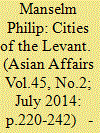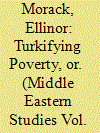| Srl | Item |
| 1 |
ID:
132342


|
|
|
|
|
| Publication |
2014.
|
| Summary/Abstract |
Global cities are almost by definition somewhat detached from their geographical hinterlands. Cosmopolitan and modern, they are open to external influences from other cultures and from overseas trade. But they are also vulnerable to the rise of nationalism in the country which surrounds them, as is shown by the fate of three famous cities of the Levant, Alexandria, Smyrna and Beirut. They were multicultural trading cities, linking the economies of Europe and Asia, "windows on the world", in contrast to inland capitals like Cairo Ankara and Damascus. New global cities like London, Hong Kong and Dubai also have hybrid and polyglot inhabitants, like Levantine cities of bygone days. But they will need support if their cosmopolitanism is to prevail over nationalism.
|
|
|
|
|
|
|
|
|
|
|
|
|
|
|
|
| 2 |
ID:
164901


|
|
|
|
|
| Summary/Abstract |
This article shows that ‘Turkification’, a term widely used by historians of modern Turkey to refer to the forced transfer of property from Christian into Muslim hands, ought to be conceptualized not only in the sense of ‘enrichment’ but also, with regard to the working classes, as a process in which Muslim people inherited the poverty of their Christian predecessors. Taking İzmir as a case in point, the article first describes the plight of the overwhelmingly Christian working class prior to 1922. It then studies reports and editorials that discussed the economic and social situation in İzmir in the years 1923 to 1926, after the Turkish victory and forced migration of her Christian population. Over the course of these years, İzmir experienced a serious economic crisis, and bread prices reached levels that led to widespread undernourishment and hunger among the cityʼs poor. Agricultural production was lagging behind pre-war levels, and positive effects of ‘Turkificationʼ policies were failing to materialize. By analyzing the contemporary journalistsʼ attempts at explaining the crisis, but also pointing out national and transnational factors that they were probably unaware of, the article makes an original contribution to the economic and social history of early republican Turkey.
|
|
|
|
|
|
|
|
|
|
|
|
|
|
|
|